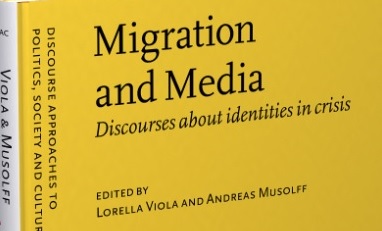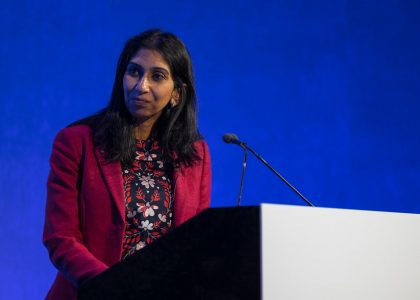Andreas Musolff is Professor of Intercultural Communication at the University of East Anglia. Lorella Viola is a Postdoctoral Researcher at Utrecht University who received her PhD student here at UEA. They both very kindly found some time in their diaries to talk to us about their new book – Migration and Media: Discourses about Identities in Crisis. The book is coming out with John Benjamins Publishing in March 2019.
Q Lorella and Andreas, many congratulations indeed on the publication of your new book! Your focus on migration and the media is clearly very timely: could you say a little bit about why you decided to publish this book? And, perhaps, why you decided to publish this particular book now?
L&A: Thank you, it is a great pleasure for us to talk about this project which we both felt was strongly needed. Indeed analysing media coverage of migrants is intrinsically interesting, particularly because by influencing both the public and policy makers, it significantly impacts on the way that migrants and the host society interact. Migrants are often depicted in the media as a burden to the host societies, or blamed for complex socio-economic problems, but what we realised by analysing media discourse was that host societies are seen more and more as being threatened in their core existence by “migrants”, “asylum seekers”, and “refugees”. These categories often blend into each other to form one threatening entity. Understanding how migrants are represented in the media is therefore key to understand the growing sense of crisis in both personal and collective identities that dominates the socio-discursive landscape of migration. And this is precisely the focus of this volume.
Q Thank you! I wonder if you could give us some background on how you both become interested in this research area – and how this book builds on some of your earlier work?
L: The topic of migration and in particular the socio-cognitive dimension of migration has always been close to my heart. This is because I have always been a migrant myself: I was born in the North of Italy but my parents are both from the South. In the years after the so-called economic boom, the North of Italy became the site of bitter rivalries between North and South, mainly caused by the mass migrations from the southern regions. The tensions against Italian intra-migrants are precisely what I analyse and discuss in chapter two of this volume. I was often victim of xenophobic attitudes in those years, which coincidentally, are also the years when the populist party, Lega Nord (North League), was starting to get more consensus. Therefore, when Andreas asked me to be part of this project, it was really like it was meant to be. This book also perfectly complements my current research strand on the relationship between media and diasporic communities.
A: Together with colleagues in PPL, especially in LCS in the Migration Research Network, I have been involved in a number of research and engagement activities to promote the study of other languages and cultures and intercultural communication that ensues from their contact, e.g. in Norwich/Norfolk as places of “interculture”. In this context we can observe an ever greater complexity and intensification of diversity, for which the term “superdiversity” has been coined. On the other hand, this superdiversity is perceived by parts of the public as an existential threat to their ‘home identity’, which gives rise to aggressive rhetoric and a backlash in the form of romanticising monolingualism and monoculturalism. Linguistic and cultural studies have to engage with these “language myths” and analyse them critically in order to foster a positively valued intercultural community.
Q Did any of the findings in the book surprise you at all?
L&A: I think what really surprised us was the strong emergence of patterns across the different case studies. These patterns, in turn, seem to uncover the underlying – and often invisible – causes that determine the framing of migrants, including potential unconscious biases related to the news coverage. Because mass media remain one of the main sources of information and opinion-formation, the finding would suggest that similarities in migration discourse impact on both public and policy makers in similar ways. Thus, understanding such patterns is essential also to comprehend political and public attitudes that shape behaviour and policy.
Q It is hard – as a non-expert – to stay optimistic on media discourse around migration, especially in the UK, when those identified as foreign seem to be so consistently demonised. Did you uncover anything that might give us hope in the present political climate?
L&A: You’re right, it is hard to stay optimistic, and it is even harder when as scholars we look at the consequences on our daily lives of such demonization. I think one important point that we make through the exploration of the fourteen case studies in the book, which are concerned with different European countries and the US, is that similar patterns seem to emerge ubiquitously and simultaneously. This is rather alarming especially in the context of news globalisation in which anything can become viral very quickly and have big resonance in parts of the world very distant from the starting places. This is perhaps what we hoped to give the readers with our book an in-depth, data driven analysis of those linguistic strategies that are used to frame migration, and indicate alternative strategies that help diffuse latent ideologies.
Q That’s very interesting – thank you! Looking forward, then, what is the next project on your research agendas? Will you be building on this work going forward?
L&A: We will certainly build on this work as we both feel that it is important to analyse past and current narratives about migration in these times so heavily characterised by xenophobia and immigration fears. Lorella is currently working on Italian populism, specifically to understand the way in which populist politicians are using new media to engage with their audiences, how they manipulate their messages, and what sort of metaphorical scenarios they seem to prefer. Andreas investigates the popular/populist trend to frame one’s ‘home nation’ identity by identifying one’s nation as part of one’s on physical and personal identity, as a presupposition that intercultural studies and the promotion of interculturality have to take into account if they wish to have social impact.
Q One final question, if we might? Now that Migration and Media is about to be published, what are your hopes for the book? What would you like readers to take away from it, and what impact would you like it to have on the world?
L&A: Throughout the four parts and across the fourteen chapters of this book, we offer a multi-layered discourse analysis approach which encompass several methods, varying sets of data, and different discourse scenarios in a range of languages. We thus hope to have provided an empirical, broad, and in-depth understanding of the linguistic means and communicative strategies used to construct ‘identity-in-crisis’ scenarios. Present-day mass migration patterns challenge the identity-construction and -performance for all communities; our volume aims to contribute to overcoming such challenges for self- and other-understanding.
Andreas Musolff and Lorella Viola, thank you very much indeed for your time. Migration and Media: Discourses About Identities in Crisis is shortly to be published by John Benjamins.





